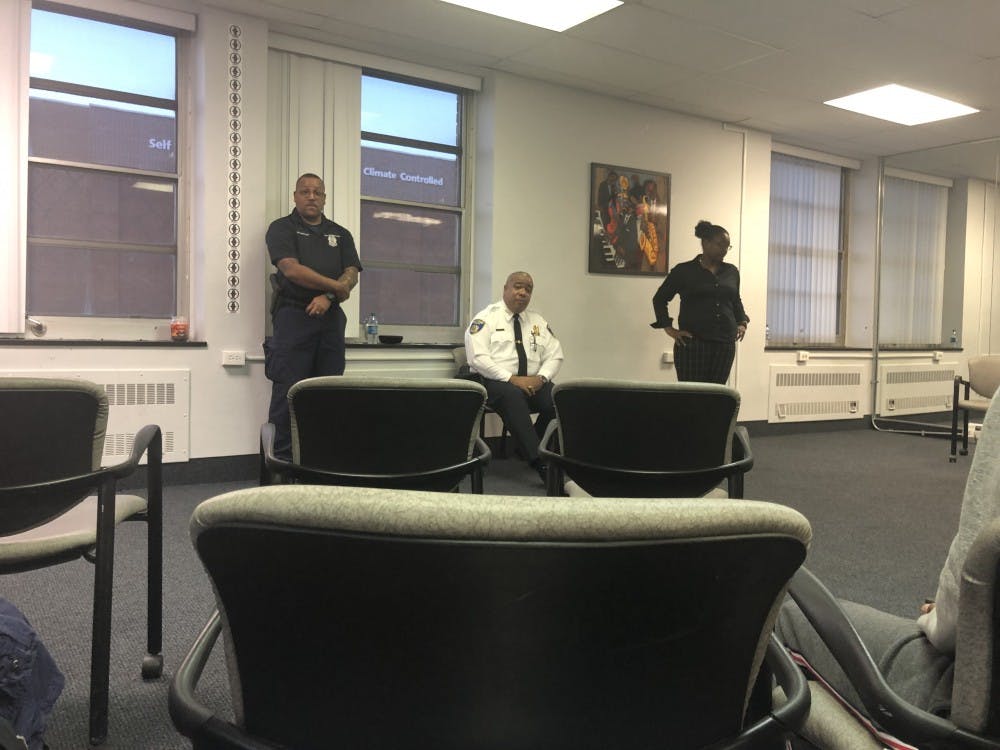The Pride Center of Maryland held a discussion with Baltimore Police Commissioner Michael Harrison on Tuesday, Sept. 25. Harrison told attendees that one of his top priorities is bringing the Baltimore Police Department (BPD) in line with what city residents need from their police department.
“We want to transform the department into the department you deserve. We want to ensure protection and safety for everybody. We want you to be safe and feel safe, and those are two very different things,” he said.
The hour-long discussion centered around common issues for law enforcement, including mental health issues, violence against the trans community, human trafficking and cooperation with other law enforcement agencies.
Since 2012 the BPD has had five different commissioners. Harrison was sworn in this past March and since then has unveiled plans for how BPD can better fight crime while serving the community.
Chris Bilal, an activist who lives near the University’s East Baltimore campus, asked the commissioner a question about a Memorandum of Understanding (MOU) between the BPD and the planned Hopkins private police force. The MOU will set down in writing the details of the private police force’s authority and jurisdiction.
“There has already been a year or two of meetings with the community at Hopkins. When it is time for an MOU, we will be very public,” he said. “The language is fairly general: We will be able to authorize their jurisdiction and authority; [the police force] will be limited to campus, students, faculty, certain boundaries where students and faculty are.”
Harrison discussed his previous experience of working with university police departments during his time as the superintendent of the New Orleans Police Department. He also detailed his observations about Baltimore’s other university police forces.
“It seemed a little strange to me as a newcomer that there was a university that didn’t have a police department because I had never seen that before,” he said.
Harrison also spoke to the role of the community in the process of establishing a new private police force.
“There is a high level of community engagement — that community engagement is coming from Hopkins to make sure they have buy-in from the community to do what it is they want to do,” Harrison said.
In 2017 the BPD entered into a consent decree with the U.S. Department of Justice, which outlined a process for modifying and improving the BPD’s practices. Harrison also commented on his belief in the importance of such new training protocols.
“It is about training all of our officers, not just because we’re in this consent decree but because it’s the right thing to do: being culturally sensitive to all communities and being sensitive to every community because different communities have different needs. We train our officers on the correct way to engage,” he said.
Harrison also spoke about how the police department is educating its officers about how to deal with situations in a manner that respects all the parties involved.
One instance of this is training officers on the departmental standards for interacting with people who are struggling with mental illness.
“Everything we’re teaching our officers is about de-escalation and minimizing the uses of force,” Harrison said. “We give training so that we can recognize that people are having a mental episode so the first response is not the use of force, the first response is the use of verbal communication to de-escalate.”
In addition to aspects of his crime plan that aim to reduce violence in Baltimore, Harrison detailed the concept of focused deterrence during the discussion.
Harrison explained that instead of focusing solely on the small percentage of individuals who commit crimes, he also intends to deal with the underlying causes of crime, such as mental health issues, homelessness and addiction.
Another part of the meeting revolved around topics regarding LGBTQ rights. Several attendees asked questions relating to the BPD’s proper use of gender pronouns and identity, the specific threat of violence to the trans community and general safety for LGBTQ community members.
Sergeant Henry Bailey of the BPD explained some of the training that officers undergo.
“We have hosted several history of Baltimore classes led by the community,” he said. “These include a youth panel talk to officers about LGBTQ youth in the city and interaction with police officers, as well as a transgender class taught by transgender members of the community to officers about understanding the transgender community.”
The attendees thanked Harrison for his effort to listen actively to the community. Several of the attendees are on a panel with Harrison and other police department workers that intends to foster communication between the community and the department.
After the forum, Bilal discussed in an interview with The News-Letter his stance on the University’s private police force.
“I was involved with the Sit-In, so I am vehemently against it and organizing around it,” he said. “I believe the force should be disbanded and shouldn’t exist; we should disarm those folks, de-escalate it and demilitarize those forces.”
Rev. Merrick Moses, president of the Pride Center of Maryland and LGBTQ community liaison of the Baltimore City State’s Attorney’s Office, ended the lecture with a few words of advice for the Baltimore community.
“It is important that this community stay engaged with us because if we don’t get feedback from the community, then we go to other places,” Moses said. “We do know that there is mistrust with our community and law enforcement.”





